- 1.1 - Programming Paradigms
- 1.2 - Elements of Programming
- call-by-name and call-by-value
- 1.3 - Evaluation Strategies and Termination
- 1.4 - Conditionals and Value Definitions
- 1.5 - Example: square roots with Newton's method
- 1.6 - Blocks and Lexical Scope
- 1.7 - Tail Recursion
- Programming Assignment: Recursion
In this week, we'll learn the difference between functional imperative programming. We step through the basics of Scala; covering expressions, evaluation, conditionals, functions, and recursion
1.1 - Programming Paradigms
imperative programming:
- modify mutable variables
- using assignments
- control structures: if-else, loops, break, continue, return, etc.
~~~> Von Neumann computer:

conceptualize data structures word-by-word. ⇒ need higher level abstractions (theories).

theory doesn't describe mutations!
ex. theories of polynomials

To implement high-level concepts following their math theories, there's no place for mutation.

Functional programming
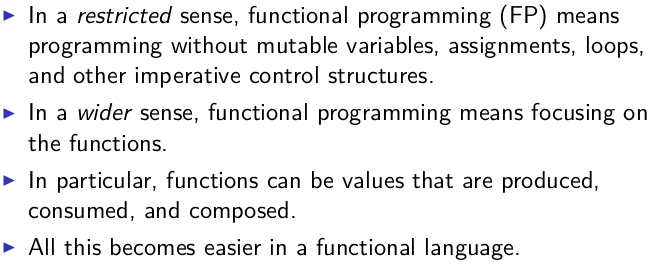
functions in FP language are 1st-class citizens.
1.2 - Elements of Programming
in a language:
- primitive expressions
- operators to combin expressions
- abstract expressions: introduce a name for an expression
primitive types in scala are written capatilized:

REPL
interactive shell: write expressions and respond its value
Evaluation
evaluation: expression → value
evaluation stops onces it results in a value.
evaluate non-primitive expressions:
- take the left-most operator
- take (left and right) operands
- apply the operator to operands
evaluate names:
replace the name with the rhs of its definition.
definitions can have parameters.
ex. variable/return types are after their names, seperated by a :
def power(x: Double, y: Int): Double = ...
evaluate a parameterized function:

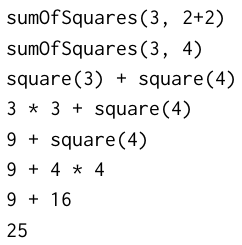
This scheme is called "substition model" — formalized in the lambda calculus. This can be applied as long as there is no side effects(ex. modify variable c++).
Termination
Q: does every expression evaluates to a value?
NO, ex.
def loop: Int = loop
change evaluation strategy
do not reduce argument values before rewrite function application.
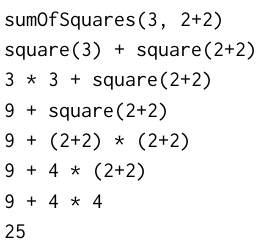
call-by-name and call-by-value
the above evaluation schemes.
- call-by-value: reduce argument values before rewrite function application.
advantage: it evaluates every function argument only once.
- call-by-name: do not reduce arg values
advantage: a function argument is not evaluated if the corresponding parameter is unused in the evaluation
of the function body.
ex.
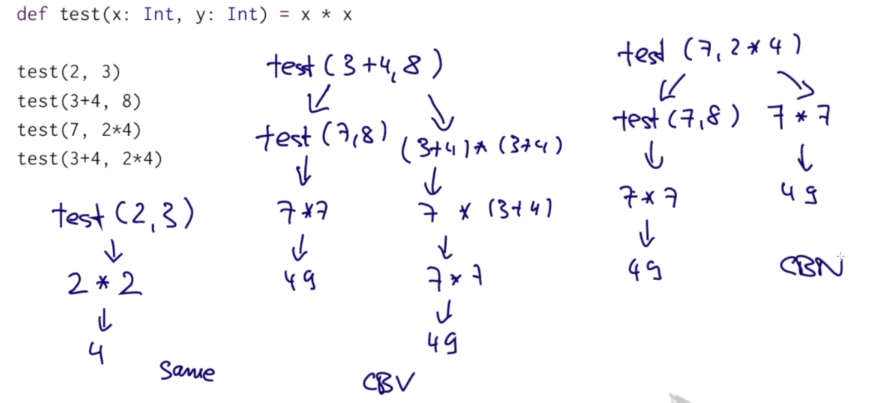
1.3 - Evaluation Strategies and Termination
CBV and CBN:


ex.
def first(x: Int, y: Int) = x
first(1, loop)
in scala:
- normally use call-by-value (more efficient than call-by-name because it avoid repeated computation of CBN).
- but: if a
=>before a parameter type, that parameter is called by-name.
ex.
def constOne(x: Int, y: => Int) = 1
constOne(1+2, loop)
constOne(loop, 1)
1.4 - Conditionals and Value Definitions
conditional expressions
the if-else expression
the if-else is an expression, not statement.
ex. def abs(x: Int): Int = if (x>=0) x else -x
the x>=0 is a boolean expression, sometimes called predicates.
CBN and CBV for definition
defform is by name, its rhs is evaluated at each usevalis by value, evaluted at the definiton
ex.
scala> def loop:Boolean = loop
loop: Boolean
scala> def x = loop
x: Boolean
scala> val x = loop
Execution interrupted by signal.
exercice: implement and(x,y)
scala> def and(x:Boolean, y: => Boolean) = if(x) y else false
and: (x: Boolean, y: => Boolean)Boolean
scala> and(false, loop)
res3: Boolean = false
1.5 - Example: square roots with Newton's method
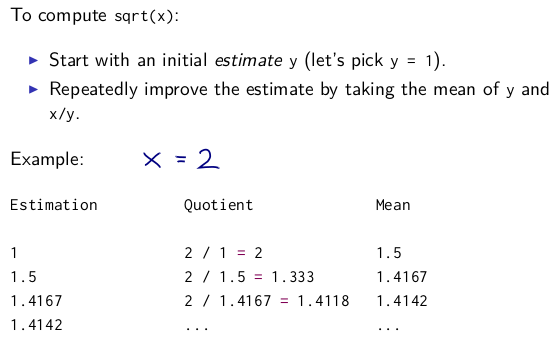
def sqrt(x: Double): Double = ...
need helper (recursive) functions.
note: in scala the return type of recursive functions must be given.
def improve(guess: Double, x: Double): Double =
(x / guess + guess) / 2.0
def isGoodGuess(guess: Double, x: Double): Boolean =
math.abs((guess * guess - x)/x)<0.001
def sqrtItr(guess: Double, x: Double): Double = {
if (isGoodGuess(guess, x)) guess
else sqrtItr(improve(guess, x), x)
}
def sqrt(x:Double): Double = sqrtItr(1, x)
1.6 - Blocks and Lexical Scope
nested functions
put aux functions inside a function.
def sqrt(x:Double): Double = {
def improve(guess: Double, x: Double): Double =
(x / guess + guess) / 2.0
def isGoodGuess(guess: Double, x: Double): Boolean =
math.abs((guess * guess - x)/x)<0.001
def sqrtItr(guess: Double, x: Double): Double = {
if (isGoodGuess(guess, x)) guess
else sqrtItr(improve(guess, x), x)
}
sqrtItr(1, x)
}
blocks and visibility
blocks: delimited by braces {...}
The last element of a block is an expression that defines its value.
Blocks are themselves expressions; a block may appear everywhere an expression can.

ex.
val x = 0
def f(y: Int) = y +1
val result = {
val x = f(3);
x * x
} + x // result = 16
ex. eliminate the parameter x of helper functions inside the sqrt function
def sqrt(x:Double): Double = {
def improve(guess: Double): Double =
(x / guess + guess) / 2.0
def isGoodGuess(guess: Double): Boolean =
math.abs((guess * guess - x)/x)<0.001
def sqrtItr(guess: Double): Double = {
if (isGoodGuess(guess)) guess
else sqrtItr(improve(guess))
}
sqrtItr(1)
}
about multiline expressions: put the operator in the first line to avoid ambguity.
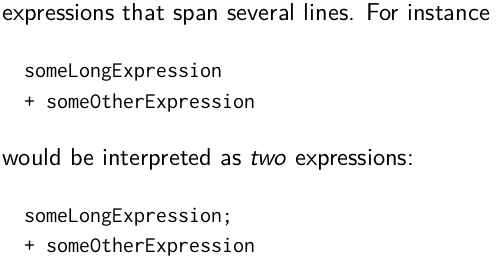
1.7 - Tail Recursion
review: evaluation of function application.


ex1. gcd
def gcd(a:Int, b:Int): Int=
if(b==0) a else gcd(b, a%b)
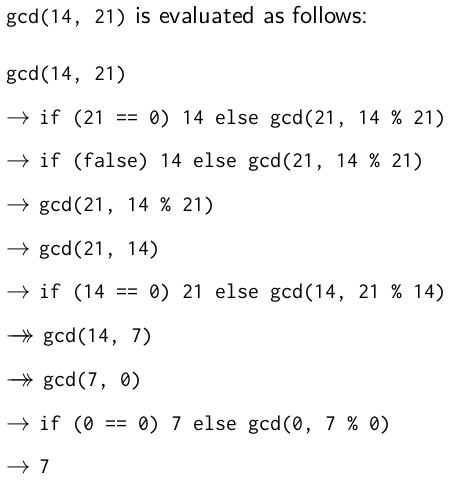
ex2. factorial
def factorial(n:Int): Int =
if(n==0) 1 else n*factorial(n-1)
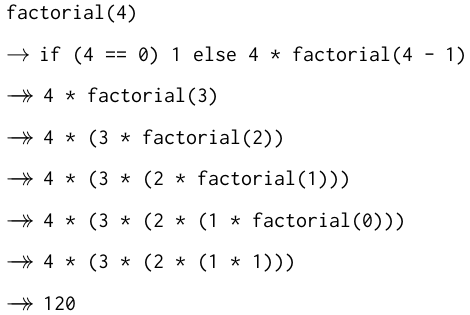
difference from the gcd case:
- in
gcd, the expression is reduced to agcd() - in
factorial, add one more element to the expression in each step!
tail recursion
if a function calls itself as its last action, then the function's stack can be reused.
⇒ tail recursion functions are iterative process.
In general, if the last action of a function consists of calling a function (which may be the same), one stack frame would be sufficient for both functions. Such calls are called tail-calls.
tail-recursive function:
- more efficient
- can avoid stackoverflow
- might not be as clear as a non-tailrec version
add @tailrecannotation to the function, if its not tailrec, an error will be shown.
@tailrec
def gcd(a: Int, b: Int): Int = ...
exercice: turn factorial into tailrec fashion.
→ idea: use an accumulator (partial result) acc .
def factorialTR(n:Int):Int = {
@tailrec
def fact(n:Int, acc:Int):Int = {
if(n==0) acc
else fact(n-1, n*acc)
}
fact(n, 1)
}
Programming Assignment: Recursion
三道递归的练习题...
/**
* Exercise 1
*/
def pascal(c: Int, r: Int): Int = {
if (c == 0 || c == r) 1
else pascal(c, r - 1) + pascal(c - 1, r - 1)
}
/**
* Exercise 2
*/
def balance(chars: List[Char]): Boolean = {
def balance_rec(chars: List[Char], acc: Int): Boolean = {
if (acc<0) false
else if (chars.isEmpty) acc == 0
else if (chars.head == '(') balance_rec(chars.tail, acc+1)
else if (chars.head == ')') balance_rec(chars.tail, acc-1)
else balance_rec(chars.tail, acc)
}
balance_rec(chars, 0)
}
/**
* Exercise 3
*/
def countChange(money: Int, coins: List[Int]): Int = {
if(money==0 ) 1
else if(coins.isEmpty || money<0) 0
else countChange(money, coins.tail) + countChange(money-coins.head, coins)
}
Disqus 留言